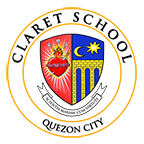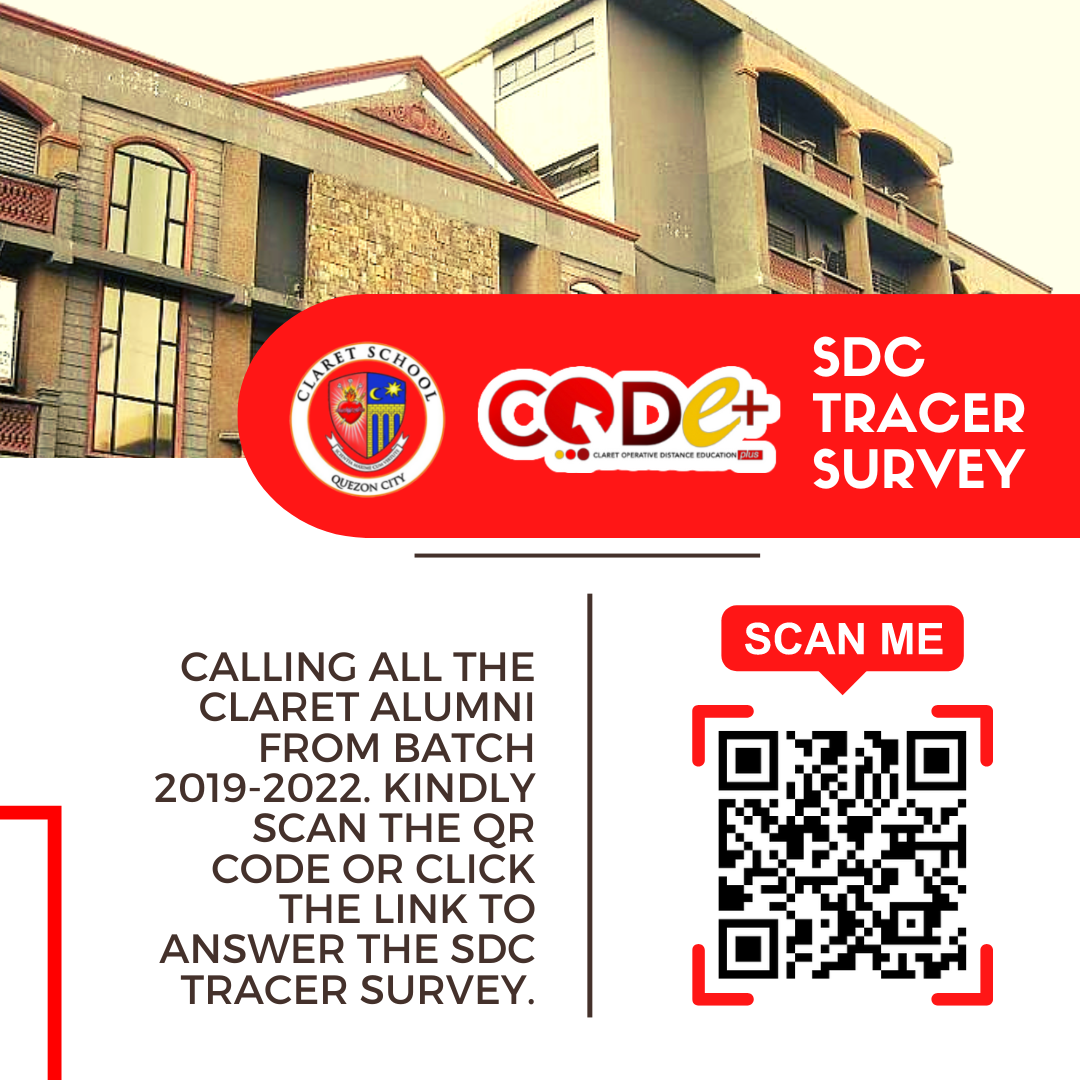INTRODUCTION
The current worldwide health crisis keeps Claret School of Quezon City to be true to its mission of building God’s Kingdom. Mindful of the mental health and wellness of the entire Claretian community, particularly the students, Claret Operative Distance Education (CODE) is based on the rational and articulated understanding of a human being as the subject of education (the learner) and as the object as well (the center of the curriculum and the entire program). Human being here refers to what Claret School envisions its learners as “a Christian community of disciples who are academically excellent and faithful servants of the Word” in its commitment to build God’s Kingdom. The School realizes this vision through an integral education in which the students are formed in the spirituality of St. Anthony Mary Claret who dreamed for the youth whom he loved – the youth who should “deal with the poor in the same way they would like to be treated if they were in their place – to comfort, to help and to make everything possible to alleviate them.”
Hence, during this time of Covid-19 Pandemic, the School aims to provide a consistent learning experience anchored on the Claretian core values: Compassion, Humility, Empowerment, Excellence, Respect for Life, and Service to Others (CHEERS). This Distance Education Continuity Plan is Claret School’s response to ensure the delivery of quality, value-laden, academically focused, and holistic brand of education.
KEY WORDS
- ONLINE LEARNING or e-learning is education via internet.
- ONLINE LEARNING PLATFORM is an integrated set of interactive online services that provide learners with information, tools and resources to support learning.
- SYNCHRONOUS instruction allows the students to meet real time with their teachers online.
- ASYNCHRONOUS instruction happens through online channels without real time interactions. This engages students in self-paced learning.
- LEARNING PACKETS or MODULES are printed instructional materials available for students with limited connectivity and electronic devices. As a provisional strategy in the absence of face-to-face instruction, consultations with teachers are done through conference via SMS, e-mails calls, and other messaging platforms during the scheduled consultation time.
- LEARNING GUIDES are teacher-made plans for students and parents that include timeframe, lessons and competencies, self-study activities, and exercises for developmental learning.
FEATURES
Claret School understands that the current pandemic has put students and their families in different situations. Given this, Claret School distance education plan has the following features designed to ensure holistic development and formation of learners.
Academic and Non-Academic Offerings
- Physical limitations are considered in identifying subjects being offered. The School sees to it that academic excellence is not sacrificed. Hence, the following subject areas, with the specified number of meetings per week, are included:
| | CLE | MATH | SCIENCE | READ | LANG | FIL | AP |
| K | 1 | 1 | | 2 | 1 | 1 | |
| 1 | 1 | 2 | 1 | 2 | 1 | 2 | 1 |
| 2 | 1 | 2 | 1 | 2 | 1 | 2 | 1 |
| 3 | 2 | 2 | 2 | 2 | 1 | 2 | 1 |
| 4-6 | 2 | 2 | 2 | 2 | 1 | 1 | 1 |
-
- Computer is offered beginning Grade 2 and is met once a month. One Science slot during the month is dedicated for this purpose.
- MAPE-HELE (Music, Art, Physical Education, and Home Economics and Livelihood Education) are treated as separate subjects with one synchronous instruction slot each month. However asynchronous activities per subject are assigned during the month.
- CO-CURRICULAR CLUB is met synchronously twice a month on a fixed schedule. The program is designed to complement the curricular offerings of the Unit. Activities in the program lead and help students to collaborate, solve problems, think critically, communicate effectively, and create new ideas. The integration of life-skills in the club program enhances further the personality and socioemotional development of the students.
- HOMEROOM PROGRAM, which is met synchronously twice a month, acts as the complementary force that supports the academic program of the school. It aims to assist students to transition smoothly to a new grade level, foster leadership and community building among members of the class and help build healthy student-student and student-teacher relationship. Furthermore, it provides an avenue in the deepening of the school core values CHEERS.
-
- The abovementioned subject areas and programs are considered to ensure the development of essential skills and competencies to enable students to:
- communicate effectively and think critically both in English and Filipino which involves the five macro skills namely listening, speaking, reading, writing, and viewing to help them become effective participants in community building and economic development.
- acquire and apply scientific process skills in their daily life situations. Claret online curriculum offers meaningful experiences through guided discovery and hands-on activities, making and using models, researching, interviewing, writing reports, and conducting investigatory activities.
- use mathematical understanding to be able to make critical and informed decisions, defend their ideas and evaluate the ideas of others and strive to analyze and solve problems linked to everyday life.
- express understanding about the necessity to survive through dignity of work, entrepreneurial skills and to become productive in life.
- exhibit personal talents and potentials when dealing with others, caring for the environment, and in preserving peace within the family and in the community where they belong.
- equip themselves with the 21st Century Skills specifically digital literacy for them to become responsible users of technology and social media.
-
Online Class Routines
- Each school day includes the following:
- Learning and assigned tasks are posted on the designated day before 8:00 AM.
- Students are welcomed to class with a prayer.
- Students are provided an overview of the week for the upcoming online class.
- Appropriate formats (documents, slides, pre-recorded video, etc.) are used by the teachers.
- Consultation time is included in the day’s schedule.
Modes of Delivery
- SYNCHRONOUS instruction enables students and teachers to meet face-to-face online via Microsoft 365.
- ASYNCHRONOUS instruction engages students online in self-paced learning without necessarily meeting face-to-face. These modes can be combined where learning materials, assessments, tasks, and activities, are exchanged and accomplished online. The combined modalities benefit students who have consistent and stable Internet connection and needed electronic devices.
- LEARNING PACKETS or MODULES are printed instructional materials available for students with limited connectivity and electronic devices. These materials can be picked up from the school.
Consultation Periods
The consultation period in the class schedule is dedicated for home-to-school communication sessions or dialogue. Consultation with teachers by students and parents can be done through conference via SMS, e-mails, phone calls, and other messaging platforms.
Grading System
The development of skills and competencies as well as addressing specific learning needs of a student is the primary focus of the teachers’ delivery of instruction. Teachers need to employ effective strategies to provide meaningful, timely, and responsive teaching and learning process. The School observes the three terms /trimester for Senior Nursery (SN); Kinder – Grade 6. Junior Nursery (JN) is on semestral basis.
The results of performance assessments serve as guide in giving student ratings. Hence, the utilization of a modified grading scheme where students are graded the following: (More details about the grading scheme will be provided to parents).
| P+ | With distinction | Student performed beyond expectations. |
| P | Passed | Student met expectations. |
| FC | For Completion | Student has not fully met expectations. |
Online Learning Requirements
The Claret Operative Distance Education (CODE) uses Microsoft 365 as platform. The School will provide technical support to students and parents to familiarize them on the features of the Learning Management System. To enable participation in online learning, the following considerations are suggested in the choice and/ or use of gadget:
- durable and strong
- fast and reliable Internet connectivity to access websites or search information/ data
- minimum specification needed to store data (4GB memory for laptops/ notebook and 16 GB memory for tablets and ipads)
- camera for taking photos and videos
- camera, microphone, and earphones / headphones for video calls or teleconferencing and online discussions
- creating documents and presentations
- recording audio files
- editing photos and videos
- recording screens
- accessing and using Microsoft 365
Parental assistance is required for students in N, K-G3 while independence and self-reliance are being promoted in Grades 4-6.
The Class Schedule
The class schedule has been designed to meet the required minimum screen time for students in a day. Their limited capacity to explore online or attention span for virtual interactions has been taken into consideration. Hence, the following screen time:
| Nursery | 20-30 Minutes |
| Kinder | 60 minutes |
| Grade 1-3 | 120 Minutes |
| Grade 4-6 | 150 Minutes |
The Student-Adviser Time (SAT) in the morning serves as a venue where teachers welcome their students and to make them feel comfortable for the day’s session.
Reasonable short breaks in between have been included to enable students to rest and prepare for the next sessions. One day during the week is dedicated for non-academic activities, formation programs, and socioemotional sessions by the guidance counselors. The afternoon is reserved for consultations and intervention purposes.
Below are sample class schedules per level. Arrangement of subjects will vary depending on the number of sections and teachers that will be assigned in the level.
Kindergarten
| Time | Monday | Tuesday | Wednesday | Thursday | Friday |
| 8:00 – 8:15 | Circle Time |
| Circle Time |
| Circle Time |
| 8:15 – 8:45 | Story Telling/ Reading |
| Story Telling/ Language |
| Story Telling/ Reading |
| 8:45 – 9:15 |
|
|
|
|
|
| 9:00 – 9:30 | CLE | MAPE | Math | CLUB/ FUN Thursday | Filipino |
| 9:30 – 10:00 |
|
|
|
|
|
| 10:00 – 11:00 | Academic Consultation Period | ||||
Nursery schedule with reduced interaction time will be posted pending consultations.
Grade 1
| Time | Monday | Tuesday | Wednesday | Thursday | Friday |
| 8:00 – 8:10 | “SAT” |
|
|
|
|
| 8:10 – 8:20 |
|
|
|
|
|
| 8:20 – 9:00 | Reading | Math |
| Filipino | Science |
| 9:00 – 9:20 |
|
|
|
|
|
| 9:20 – 10:00 | Reading | Math |
| Filipino | MAPE |
| 10:00 – 10:20 |
|
|
|
|
|
| 10:20 – 11:00 | CLE | Language |
| AP | CLUB/HRP |
| 11:00 – 12:00 | Lunch | ||||
| 1:00 – 2:00 | Academic Consultation Period | ||||
| 2:00 – 3:00 | Non-Academic Consultation Period | ||||
Grade 2
| Time | Monday | Tuesday | Wednesday | Thursday | Friday |
| 8:00 – 8:10 | “SAT” |
|
|
|
|
| 8:10 – 8:20 |
|
|
|
|
|
| 8:20 – 9:00 | Reading | Math |
| Filipino | AP |
| 9:00 – 9:20 |
|
|
|
|
|
| 9:20 – 10:00 | Reading | Math |
| Filipino | MAPE |
| 10:00 – 10:20 |
|
|
|
|
|
| 10:20 – 11:00 | CLE | Language |
| Science/Comp | Club/HRP |
| 11:00 – 12:00 | Lunch | ||||
| 1:00 – 2:00 | Academic Consultation Period | ||||
| 2:00 – 3:00 | Non-Academic Consultation Period | ||||
Grade 3
| Time | Monday | Tuesday | Wednesday | Thursday | Friday |
| 8:00 – 8:10 | “SAT” |
|
|
|
|
| 8:10 – 8:20 |
|
|
|
|
|
| 8:20 – 9:00 | CLE | Math |
| Filipino | Science/ Comp |
| 9:00 – 9:20 |
|
|
|
|
|
| 9:20 – 10:00 | CLE | Math |
| Filipino | Science |
| 10:00 – 10:20 |
|
|
|
|
|
| 10:20 – 11:00 | Reading | AP |
| MAPE | Language |
| 11:00 – 11:20 |
|
|
|
|
|
| 11:20 – 12:00 | Reading |
|
|
| CLUB / HRP |
| 12:00 – 1:00 | Lunch | ||||
| 1:00 – 2:00 | Independent Work/ Academic Consultation Period | ||||
| 2:00 – 3:00 | Non-Academic Consultation Period | ||||
Grades 4-6
| Time | Monday | Tuesday | Wednesday | Thursday | Friday |
| 8:00 – 8:10 | “SAT” |
|
|
|
|
| 8:10 – 8:20 |
|
|
|
|
|
| 8:20 – 9:10 | CLE | Math | CLUB/HRP | Reading | Filipino |
| 9:10 – 9:40 |
|
|
|
|
|
| 9:40 – 10:30 | CLE | Math |
| Reading | Science/Comp |
| 10:30 – 11:00 |
|
|
|
|
|
| 11:00 – 11:50 | AP | Language |
| MAPEH | Science |
| 11:50 – 1:00 | Lunch | ||||
| 1:00 – 2:00 | Independent Work/ Academic Consultation Period | ||||
| 2:00 – 3:00 | Independent Work/ Non-Academic Consultation Period | ||||
Student Activities
Claret School of Quezon City provides a variety of cocurricular and extracurricular clubs where the students can engage in meaningful experiences to help them become well-rounded and talented individuals. Students choose from an array of clubs offered by the school.
Academic-related clubs, performing arts clubs, sports clubs, civic-related clubs and hobby clubs provide opportunities for students to enhance their individual skills. Leadership potentials are also honed through the Samahang Barangayette ng Claret (SBC) while the creative writing skills and oral communication skills of the students are sharpened through The Claretian (Journalism Club).
Student Discipline
Student discipline is an integral part of Claret School educational and formation programs and policies. Even during distance learning, students are expected to conduct themselves properly, recognize and be obedient to legitimate authority, and submit themselves to rules and regulations, show concern for others, and self-respect. A good Claretian is expected to always strive to show his/her best behavior anywhere, at all times.
Formation and Student Services
Student services provide the required assistance to fully implement academic and non-academic programs in school. The services aim to address the cognitive, physical, emotional, and spiritual needs of every Claretian.
The Student Development Center (SDC) continues its commitment to ensure that each student has a positive emotional disposition (well-being) as well as a healthy and sound mind (mental health). The center provides online check-ins, referrals, virtual conferences, follow-up sessions, and group guidance activities for students so they can learn more about themselves and their potentials (strength-based activities).
The Instructional Media Center (IMC) supports the academic program with reliable, and credible online resources that is accessible to students 24 / 7. The online resources include research data bases, e-books, e-journals, magazine subscriptions and discovery service to libraries. The school librarians are ready to assist online through the IMC social media account, school website and email.
The clinic provides medical care through its online consultations, medical bulletins, medical counselling, and follow-up routine on medical concerns and cases.
Spiritual formation is integral in the life of every student in Claret School of Quezon City. The Faith Education and Enrichment Department (FEED) continues to provide spiritual activities for the student through its Campus Ministry Office (CMO). True to its mission in building a community of disciples, the CMO facilitates online Eucharistic Celebrations, recollections, retreats, masses, novenas or triduum prayers, spiritual counseling, and community involvement.
References
Synchronous Learning vs. Asynchronous Learning in Online Education: https://thebestschools.org/magazine/synchronous-vs-asynchronous-education
Cooperman, L. (2017). The Art of Teaching Online: How to Start and How to Succeed as an Online Instructor. Netherlands: Chandos Publishing.
Comparing Distance Learning and Classroom Learning: Conceptual Considerations Scholar.google.com.ph
Tobin, J.T., Mandernach, J. et al, (2015). Evaluating Online Teaching – Best Practices. San Francisco: Jossey-Bass.
Department of Education MELCS (s. 2020) and BEC (s.2017)
Claret School of Quezon City Student Handbook s. 2018.
















